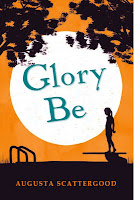It's summertime, and there's not much that Gloriana June Hemphill (Glory) looks forward to more than having her 4th of July birthday party at the community pool. This is the year she'll be turning 12 so she won't have to be supervised by big sister Jesslyn every time that she and Frankie want to go swimming.
But it's the summer of 1964, and Glory's age isn't the only thing that's changing. First off Jesslyn, who used to play junk poker and talk with Glory in their shared room, isn't really talking anymore. She's busy dressing up, putting on lipstick and sneaking visits with new boy Robbie at the library. And then there's Glory's best friend Franklin Cletus Smith (Frankie for short). Sure he's always been pushed around by his big brother J.T., but now Frankie is seeming to spew the same kind of stupidity as J.T. and his Daddy. After all, it's Frankie who tells Glory that the pool is closing. He says he overheard his Daddy talking about it. He said it has cracks and needs to be fixed. Glory doesn't see any cracks...
Hanging Moss, Mississippi has to face the fact that just because things have always been one way, doesn't make that way right. Maybe there shouldn't be a white fountain and a colored fountain. Maybe the community pool shouldn't only be for white people. Maybe the library should be open to all.
Augusta Scattergood tells one girl's story about a summer of change in the South. Glory's world view is pitch perfect as she slowly starts to understand the bigger reasons for the pool closing, and her fellow townspeople's treatment of the Yankees who have come to town. Glory is a white girl who has grown-up in the white part of town with a black maid employed by her preacher father. She has all of the spunk and indignation of an 11 year old who can see right and wrong, but has a hard time seeing where she fits into the picture. This is a great tween read that will get readers thinking about the big issues of social justice as well as the universal changes that come with growing up.
